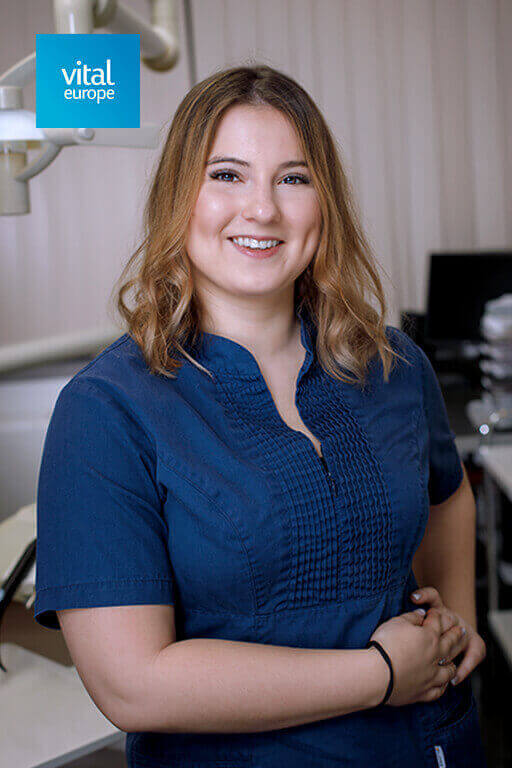“As dentists, our task is not only to heal teeth but also to improve the quality of life for our patients,” emphasizes Dr. Dóra Bátai, dentist at VitalEurope, who believes that mutual respect, collaboration, and trust are crucial in the doctor-patient relationship.

“In high school, chemistry and biology were my favorite subjects. As a result, I asked for medical books and an anatomy atlas as birthday presents. I became fully dedicated to the profession when I had to undergo knee surgery due to a sports injury. I was impressed by the professionalism and empathetic approach of my doctor. That’s when I decided to pursue a medical career. I was attracted to dentistry because it allows me to improve patients’ quality of life and self-confidence. Additionally, as a woman, it is easier to balance with starting a family compared to other medical professions,” shares Dr. Dóra Bátai about her career choice.

Conservative dentistry and prosthodontics
“At VitalEurope, I practice conservative dentistry and prosthodontics. The former includes dental fillings and root canal treatments, while the latter encompasses the process of dental restorations. I particularly enjoy prosthodontics because it is gratifying to see the patient’s satisfaction when we deliver the final work. It is an incredible feeling to experience when a patient dares to smile confidently after years of hesitation. I am also interested in implantology, which is why I completed a one-year postgraduate training in Germany.”


Challenges and teamwork
When asked about the biggest challenge in her work, Dr. Bátai responds:
“I believe that solving complex cases is the biggest challenge for everyone. It often involves evaluating which teeth can be preserved and which ones need to be removed for an optimal solution. This is where teamwork comes into play. The doctors and the dental laboratory provide valuable assistance in addressing complex cases. We often have discussions with multiple team members to find a long-term, beneficial solution that is approved by both the oral surgeon and the laboratory.”

According to Dr. Dóra Bátai, it is crucial for patients to have access to a well-functioning system that enables this teamwork.
“During the initial consultation, the patient undergoes a CT scan. I ask about their complaints and expectations. Then, I perform an intraoral and extraoral examination. The extraoral examination involves checking lymph nodes and joint movements, while the intraoral examination assesses the condition of teeth and soft tissues. I explain what I observed on the CT scan and during the examinations, and based on that, we discuss a treatment plan that suits the patient. I am satisfied with my work when the treatment provides functional and aesthetic long-term results, and the patient leaves with a positive mood.”
Comforting through conversation
“I always emphasize that the first visit is merely a conversation. During subsequent appointments, we can pause the treatment at any time. Most patients fear pain and sounds. The worst part is the injection, but the treatment itself is painless. For those patients who dislike the sound of the dental drill, I always suggest bringing earphones and listening to music on their phones. In the case of highly stressed patients, the possibility of sedation may arise. Often, spending five minutes having a conversation before the treatment helps. I explain the steps we will take that day and ask about their day, hobbies, and interests. It is important for me to create a relaxed atmosphere and alleviate dental fears,” summarizes Dr. Dóra Bátai based on her experiences. In her free time, she enjoys sports, reading, and hiking with her dog.